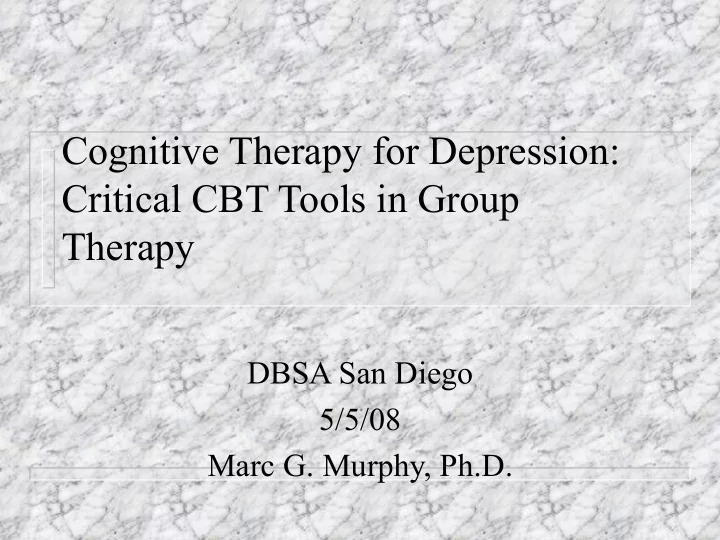

Cognitive Therapy for Depression: Critical CBT Tools in Group Therapy DBSA San Diego 5/5/08 Marc G. Murphy, Ph.D.
Sharp Mesa Vista Hospital COG-IOP Cognitive Group Therapy Intensive Outpatient Program (3 hours) – Intensive therapy 5 X week, titrating... – Depression, Bipolar, Anxiety, PTSD – Average treatment 4-8 weeks
Marc G. Murphy, Ph.D. ■ Clinical Psychologist (PSY 17565) ■ COG - IOP Therapist, Group Therapy ■ Supervisor Sharp APA Internship ■ Director: Cognitive Behavioral Psychology Clinic of La Jolla, Inc. ■ Adjunct Professor Alliant University (CSPP)
Cognitive Therapy Overview ■ Brief Overview: Aaron Beck influence - Cognitive Triad: Self Future World
Cognitive Model Situation Environmental Biological Perceptions Behavior Thoughts Images Schemas Emotions
Identify the Problem Main Problem Areas: C.A.T.A.I.L. ■ C C onflict ■ A A nger ■ T T rauma ■ A A ssertiveness ■ I I ntimacy ■ L L oss
How to identify Depression? ■ Significant feelings of depressed mood ■ Decreased functioning (work, social) ■ >2 weeks length ■ Tests including Beck Depression Inventory ■ No medical test ■ Identified 2 genes that show promise
Situations include Physical ■ What leads to a depressed state? ■ Environment (life stressors) ■ Biology (genetics) ■ 40-45% genetics 60-55% environment ■ Family history = possible genetic contribution ■ What is going on in our body?
Cognitive Model Situation Environmental Biological Perceptions Behavior Thoughts Images Schemas Emotions
Identify the signs Physical Cognitive Emotional Behavioral - - - - - - - - - - - - - - - - - - - - - - - - - - - -
Situation / Biological Signs Depression Bipolar ■ ↓ interest ■ ↓ need for sleep ■ ↓ pleasure ■ ↑ speech ■ ↑ agitation ■ ↑ mood ■ ↑ ↓ weight ■ ↑ impulsivity ■ ↑ ↓ sleep ■ ↓ energy
Thoughts / Cognitive Signs Depression Bipolar ■ ↓ concentration ■ ↑ self esteem ■ ↓ attention span ■ ↑ ideas ■ ↓ memory ■ ↑ distractibility ■ ↑ negative thoughts ■ ↑ thoughts of death ■ memories
Emotions / Feeling Signs Depression Bipolar ■ Depressed mood ■ ↑ mood ■ Sad / blue / down ■ Self esteem ■ Worthless ■ Grandiosity ■ Hopeless ■ Irritability ■ Guilt
Behavior / Action Signs Depression Bipolar ■ Withdrawal ■ ↓ need for sleep ■ Isolation ■ ↑ speech ■ Self medication ■ ↑ impulsivity ($)
Meta-analysis ■ Research shows two factors are what is critical in leading to remission. ■ Restructuring Distorted Thoughts (Thought Records) ■ Activity Scheduling (G.R.A.P.E.S.)
Distorted Thought Process Depressed vs. Non-Depressed Negative Events Positive Events ■ Internal ■ External • Internal • External ■ Global ■ Specific • Global • Specific ■ Stable • Unstable ■ Unstable • Stable
Graph of Depression - x x - x x x - x x x - x x x x - x x x x x - x x x x x - x x x x -___________________________________
Thought Records ■ Situations will trigger thought pattern (Cog Model) ■ Thoughts will be distorted, automatic, repetitive, and negative ■ Worsen depression unless challenged
Thought Record ■ Like a courtroom, unless a statement is challenged then it will be believed by the jury.
Thought Record Situation Automatic Thoughts Emotions % Rational Response TEST OF EVIDENCE Evidence that SUPPORTS the Automatic Thought Evidence that REFUTES (argues against) the Automatic Thought
Activity Scheduling ■ Need to be active ■ Exercise has been shown to increase neurotransmitter activity ■ Severe depression responds to A.S. most
G.R.A.P.E.S. ■ G G entle to self ■ R R elaxation ■ A A ccomplishment ■ P P leasure ■ E E xercise ■ S S ocial
Why Group? Individual Therapy Group Therapy Pros Pros ■ full focus ■ learn connections ■ less intense ■ resolve conflict ■ specific ■ piggy back Cons Cons ■ not as fast ■ intense ■ no social learning ■ family vs. individual
Thank You Sharp Mesa Vista Hospital Cognitive Intensive Outpatient Program 858-694-8459 Manuals on sale benefits go to helping patients cost $20.00
Recommend
More recommend